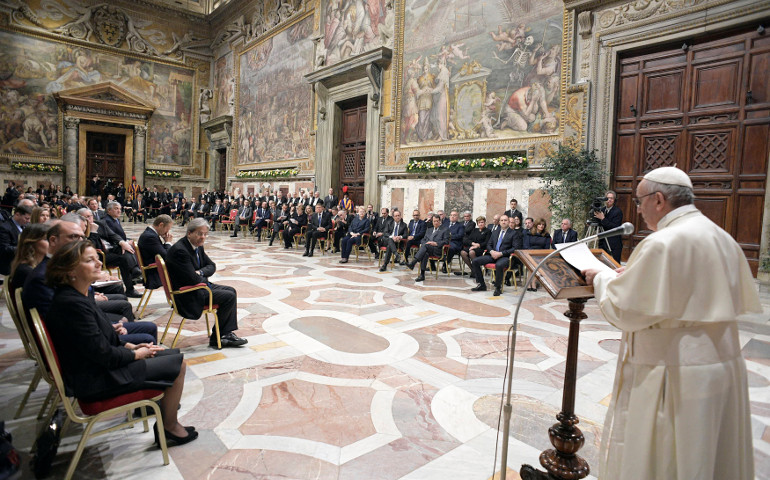
Pope Francis speaks during the European Union summit at the Vatican March 24. (CNS/L'Osservatore Romano via Reuters)
Pope Francis bemoaned a "loss of ideals" in the European Union in a meeting with the continent's 27 national leaders Friday, urging the block to fight the rise of populist movements and to reject "false forms of security" that close doors to refugees seeking safety.
In an event March 24, on the eve of the 60th anniversary of the creation of the pan-continental entity, the pontiff said decades of prosperity in Europe "have clipped the continent's wings and lowered its gaze." The pope also said Europe's leaders had forgotten their own history, particularly the lessons of the fight to remove the wall that had divided Germany for decades.
"What efforts were made to tear down that wall!" Francis exclaimed in a half-hour address. "Today the memory of those efforts has been lost."
"Where generations longed to see the fall of those signs of forced hostility, these days we debate how to keep out the 'dangers' of our time: beginning with the long file of women, men and children fleeing war and poverty, seeking only a future for themselves and their loved ones," said the pope.
Francis spoke to the leaders ahead of a commemoration March 25 for the anniversary of the March 25, 1957, signing of the Treaty of Rome, the agreement that created the EU's precursor, the European Economic Community.
The pope's remarks come as the continent is facing a series of historic questions. Next week, British Prime Minister Theresa May is expected to begin the two-year process for her country's exit from the European Union, the first in the history of the block. Populist political parties favoring exit from the union are also gaining steam in several other countries.
Francis told the 27 leaders that while the EU founders were "inspired by the hope of a better future … our time is dominated more by the concept of crisis."
But the pope also noted that the Greek root of the word crisis means to "discern, weigh, assess," and told the national leaders "ours is a time of discernment, one that invites us to determine what is essential and to build on it."
"Those who govern are charged with discerning the paths of hope, identifying specific ways forward to ensure that the significant steps taken thus far have not been wasted, but serve as the pledge of a long and fruitful journey," said Francis, before laying out five such paths of hope.
The pope called on the political leaders to fight populism and to refuse to yield to fear in the face of the continuing migrant crisis.
Calling solidarity "the most effective antidote to modern forms of populism," Francis said its work "entails the awareness of being part of a single body, while at the same time involving a capacity on the part of each member to 'sympathize' with others and with the whole."
"Forms of populism are … the fruit of an egotism that hems people in and prevents them from overcoming and 'looking beyond' their own narrow vision," he said. "There is a need to start thinking once again as Europeans, so as to avert the opposite dangers of a dreary uniformity or the triumph of particularisms."
"Politics needs this kind of leadership, which avoids appealing to emotions to gain consent, but instead, in a spirit of solidarity and subsidiarity, devises policies that can make the Union as a whole develop harmoniously," said the pope. "As a result, those who run faster can offer a hand to those who are slower, and those who find the going harder can aim at catching up to those at the head of the line."
Turning to the migration crisis, Francis said it is posing a deep question to EU leaders, namely: "What kind of culture does Europe propose today?"
"The fearfulness that is becoming more and more evident has its root cause in the loss of ideals," he said. "Without an approach inspired by those ideals, we end up dominated by the fear that others will wrench us from our usual habits, deprive us of familiar comforts, and somehow call into question a lifestyle that all too often consists of material prosperity alone."
"Europe has a patrimony of ideals and spiritual values unique in the world, one that deserves to be proposed once more with passion and renewed vigor, for it is the best antidote against the vacuum of values of our time, which provides a fertile terrain for every form of extremism," said the pope.
The 27 EU leaders are to continue their meetings Saturday, when they are expected to sign a new declaration laying out the future of their block after Britain's exit. A draft version of the document declares that "Europe is our common future" and praises the union as a "bold, far sighted endeavor."
Security has been high in Rome in advance of the event, with officials increasing efforts after the attack in London March 22. Much of the historic center of Rome will be closed to traffic Saturday, with demonstrations and protests also expected to garner crowds in the thousands. A several block area around the Vatican was cordoned off March 24 before the pope's address, blocking access to tourists or passersby.
Francis' address was his second speech in a year on the future of the European Union. In May 2016, when he accepted the prestigious German Charlemagne Prize, the pontiff reprimanded European leaders, urging them to reject calls for the re-nationalization of the continent and to "build bridges and tear down walls."
The 1957 Treaty of Rome was signed by six countries: Belgium, France, Italy, Luxembourg, the Netherlands and West Germany.
[Joshua J. McElwee is NCR Vatican correspondent. His email address is jmcelwee@ncronline.org. Follow him on Twitter: @joshjmac.]




